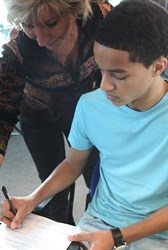Social Development Minister Bathabile Dlamini has congratulated young people from child- and youth-headed households in the care of the Isibindi Model, who have obtained their national senior certificates.
The department's Isibindi Model, an initiative that deploys trained community-based child and youth care workers in communities, is an outreach programme providing care, protection and developmental support to vulnerable children and families.
About 1,700 young people from child- and youth-headed households were supported through the 2014 matric examinations and 74% of them were successful.
According to the department, of the successful candidates, 25% achieved a Bachelor's pass, while over 20 distinctions were recorded among the candidates.
Minister Dlamini said when the department started with the Isibindi (Nguni word which means 'courage') Model, the aim was to ensure that orphans and vulnerable children do not fall through the cracks and that they have access to all basic needs so they can continue focusing on their schooling.
"The fact that so many of the vulnerable children we support have reached matric and passed proves that our efforts play a critical role in keeping them in school and in their overall development.
"This sets a solid foundation for them and government will continue to support them as they move forward in their development towards meaningful lives. We congratulate them on their success and for taking full advantage of the opportunities and support government has provided to them," said Minister Dlamini.
She also thanked the child and youth care workers who worked with the young people on a daily basis throughout the year.
She emphasised that the provision of psycho-social support by caregivers, educators, child and youth care workers, mentors and other people close to these youngsters cannot be underestimated.
"The importance of having someone to turn to, lean on and to whom one can speak to about anxiety are not easily measurable, but certainly contributed in the success of the Class of 2014," Minister Dlamini said.
The child and youth care workers organised extra classes for matriculants at safe parks in the early morning, after school and in the evenings. Safe parks were also used as places of study by the youth whose home environments were not conducive to studying.
In some areas, the child and youth care workers organised study groups to help young people who struggled with motivation to study or lacked study skills.
"Camping" sessions were organised for young people who lived too far away from their schools. Through these sessions, youth were accommodated overnight at school in order to extend study hours.
Through the Isibindi Model, the department provides social support services to about 105,000 children across the country.
The department has also established the Child- and Youth-headed Household Register in an effort to locate child- and youth-headed households in the country in order to offer them the necessary social welfare, social security psychosocial services and other integrated government services they may require for their development and well-being.














































